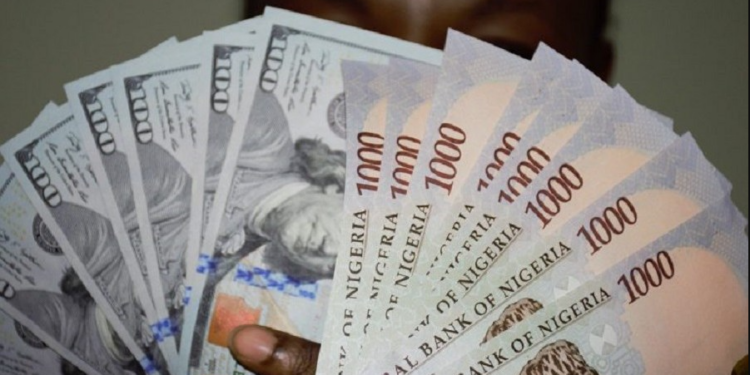The exchange rate between the naira and the US dollar depreciated to N1,596/$1 at the official Nigerian Foreign Exchange Market (NFEM) on Monday, April 28, 2025, compared to N1,589/$1 recorded on Friday, April 25, 2025.
This reflects a weakening of the local currency by N7 in just one trading session.
According to data published on the Central Bank of Nigeria (CBN) website, the naira traded at a high of N1,603.50/$1 and a low of N1,596/$1 during Monday’s session.
The simple average rate for the day was N1,601.38/$1, highlighting continued volatility within the official market.
At the parallel market, the naira also depreciated slightly against the US dollar, trading at N1,605/$1 on Monday, weaker than the N1,600/$1 recorded on Friday.
However, it still represented a mild improvement compared to N1,610/$1 traded on Thursday.
The widening gap between the official and parallel market rates, now standing at N9, underscores persistent inefficiencies and speculative activities affecting the FX market.
Broader Currency Movements
Against other major currencies, the naira also posted losses on Monday:
- N2,185.96/£1 (British Pound)
- N1,818.24/€1 (Euro)
- N1,931.69/CHF1 (Swiss Franc)
These broader currency depreciations further reflect ongoing challenges in Nigeria’s foreign exchange environment.
Market Sentiment and Analyst Views
The sustained volatility in both the official and parallel markets reflects intense demand pressures for foreign exchange from manufacturers, importers, and travelers.
Analysts attribute the naira’s persistent weakness to a fundamental supply-demand imbalance, despite the Central Bank of Nigeria’s (CBN) continued interventions aimed at stabilizing the currency.
Meanwhile, trading volumes have remained moderate, as investors and exporters adopt a cautious approach amid lingering uncertainties around the broader macroeconomic outlook, particularly concerning future monetary policy decisions on interest rates and liquidity management.
CBN Interventions
Despite CBN’s moves to boost foreign exchange supply to commercial banks and Bureaux De Change (BDCs), the naira has continued to struggle, analysts say.
- Analysts warn that while these interventions may offer short-term support, they will likely fall short without deeper structural reforms to address Nigeria’s prolonged FX issues.
- One BDC operator emphasized the need for sustained synergy between fiscal and monetary authorities, calling for more humane reforms of the FX market under President Bola Tinubu’s administration to tackle inflation and address broader economic and security challenges.
Another BDC operator urged the CBN to increase its interventions to ease liquidity pressures in the market.
Some analysts attribute the current instability to uncertainty surrounding ongoing government reforms and inconsistent access to official FX windows, which continues to fuel speculation and undermine confidence.
More insights
The CBN has recently implemented sweeping reforms aimed at unifying its multiple exchange rates, clearing the backlog of foreign exchange payment obligations, improving market liquidity, and boosting diaspora remittances.
These measures are part of broader efforts to stabilize the naira and strengthen the country’s economic fundamentals.
Meanwhile, in a positive development, global ratings agency Fitch recently upgraded Nigeria’s credit rating to B, citing improved policy credibility and reduced short-term risks to economic stability.






















